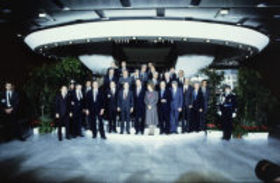Enhanced co-operation

- The European Council must unanimously approve any "enhanced co-operation" (Photo: European Commission)
The 1999 Treaty of Amsterdam allowed individual Member States to establish closer co-operation amongst themselves using the common EU institutions, so long as any agreements did not affect the "aquis communautaire" or the Common Foreign and Security Policy (CFSP). Any enhanced co-operation had to be approved by a unanimous decision of the European Council. This allowed single countries to veto. The provision was therefore difficult to obtain and was never used.
From 1st February 2003 the Treaty of Nice allowed enhanced co-operation between eight countries, inclusive of the field of CFSP, if a qualified majority approve. There are, however, some exceptions: areas that fall under exclusive EU competences and defence and military issues.
Notes
Some Euro-critics see enhanced co-operation for sub-groups of EU members as providing the legal basis for a two-tier, two-class EU. If a group of Member States large enough to have a majority within the EU decide to make decisions between themselves they will be able to run the EU without consulting the rest of the Member States. Others see it as an instrument of flexibility.
The future
The Convention on the Future of Europe proposed two kinds of enhanced co-operation within the area of defence - a structured co-operation and the normal enhanced co-operation. The difference being that a structured co-operation explicitly demands higher military capabilities as a precondition for participation, whereas this is not the case for a normal enhanced cooperation. See the draft Constitution, Art. I-40, I-43 and III-213.
Links
See also Variable Geometry and Hard Core.
